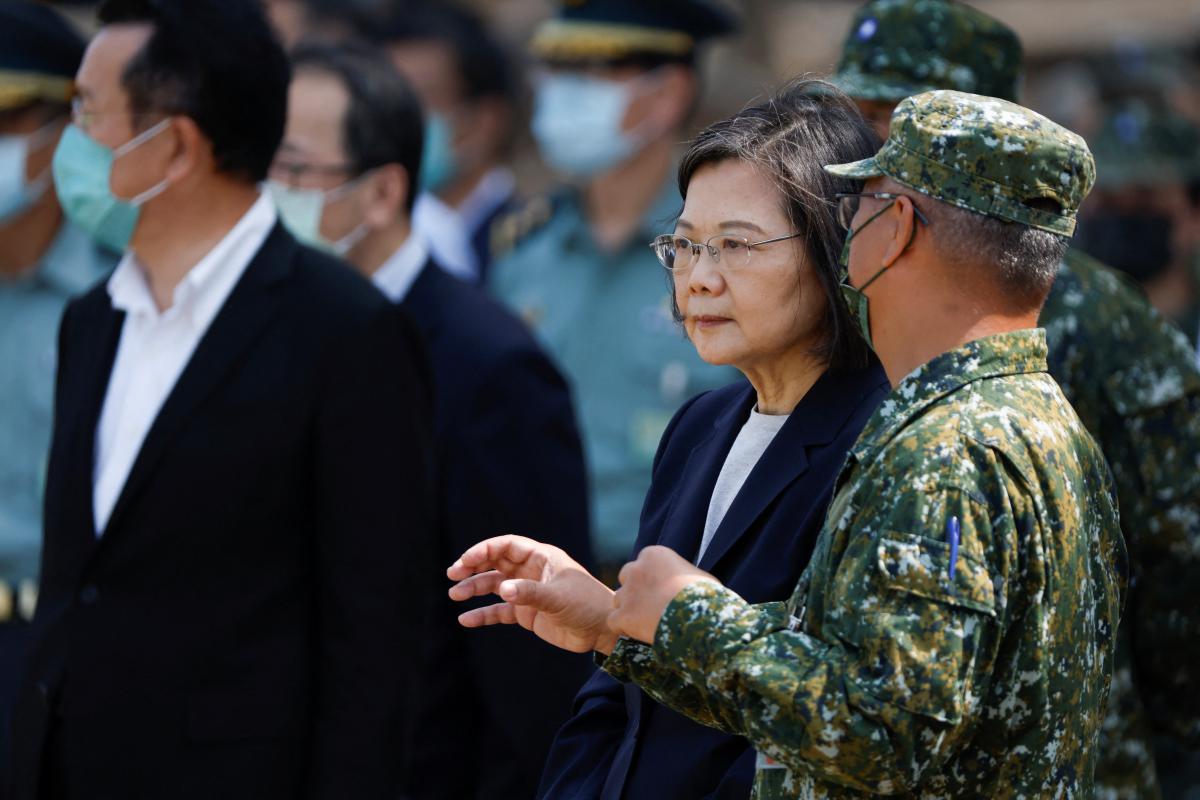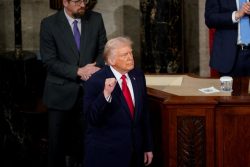
Taiwanese President Tsai Ing-wen visits a military base in Chiayi, Taiwan March 25, 2023.
14:28 JST, March 29, 2023
TAOYUAN, Taiwan/BEIJING, March 29 (Reuters) – External pressure will not stop Taiwan engaging with the world, President Tsai Ing-wen said on Wednesday as she left for the United States, hitting a defiant note after China threatened retaliation if she met U.S. House Speaker Kevin McCarthy.
China, which claims democratically-ruled Taiwan as its own territory, has repeatedly warned U.S. officials not to meet Tsai, viewing it as support for the island’s desire to be seen as a separate country.
China staged war games around Taiwan last August when then-U.S. House Speaker Nancy Pelosi visited Taipei, and Taiwan’s armed forces have said they are keeping watch for any Chinese moves when Tsai is abroad.
Tsai is going to Guatemala and Belize, transiting through New York first and Los Angeles on the way back. While not officially confirmed, she is expected to meet McCarthy while in California.
“External pressure will not hinder our determination to go to the world,” she said at Taiwan’s main international airport at Taoyuan, in a veiled reference to China.
“We are calm and confident, will neither yield nor provoke. Taiwan will firmly walk on the road of freedom and democracy and go into the world. Although this road is rough, Taiwan is not alone.”
Speaking in Beijing shortly before Tsai left, Zhu Fenglian, spokesperson of China’s Taiwan Affairs Office, said Tsai’s “transits” of the United States were not just her waiting at the airport or hotel, but for her to meet U.S. officials and lawmakers.
“If she has contact with U.S. House Speaker McCarthy, it will be another provocation that seriously violates the one-China principle, harms China’s sovereignty and territorial integrity, and destroys peace and stability in the Taiwan Strait,” she said.
“We firmly oppose this and will definitely take measures to resolutely fight back,” Zhu added, without giving details.
Tsai’s transits will come at a time when U.S. relations with China are at what some analysts see as their worst level since Washington normalized ties with Beijing in 1979 and switched diplomatic recognition from Taipei.
Taiwan is China’s most sensitive territorial issue and a major bone of contention with Washington, which, like most countries, maintains only unofficial ties with Taipei. However, the United States government is required by U.S. law to provide the island with the means to defend itself.
NO REASON TO OVERREACT
The United States says such transits by Taiwanese presidents are routine and that China should not use Tsai’s trip to take any aggressive moves against Taiwan.
The United States sees no reason for China to overreact to planned transits of the United States this week and next month by Taiwan’s president, senior U.S. officials said ahead of Tsai’s departure.
A senior U.S. official said that in her previous transits Tsai had engaged in a range of activities, including meetings with members of Congress, the Taiwanese diaspora and other groups.
“So there’s absolutely no reason for Beijing to use this upcoming transit as an excuse or a pretext to carry out aggressive or coercive activities aimed at Taiwan,” the official said.
Taiwanese presidents routinely pass through the United States while visiting diplomatic allies in Latin America, the Caribbean and the Pacific, which, although not official visits, are often used by both sides for high-level meetings.
Taiwan’s government rejects China’s sovereignty claims, and while Tsai has repeatedly offered talks with Beijing she has also said only Taiwan’s people can decide their future.
Tsai’s trip has unnerved security agencies in Taiwan, who worry that China could launch a series of influence campaigns including spreading misinformation on social media platforms to sway public perceptions of Tsai’s U.S. transit, according to an internal memo by a Taiwan security agency, a copy of which was reviewed by Reuters.
The note said China had used large-scale influence campaigns including cyber attacks against Taiwan during Pelosi’s visit last year, and Taiwan authorities expected Beijing to deepen its “cognitive operations” in the coming days.
China claimed another diplomatic victory over Taiwan on Sunday when one-time loyal Taiwan ally Honduras switched diplomatic recognition to Beijing. Only 13 countries now maintain formal ties with Taiwan.
China says that both it and Taiwan belong to “one China” and that as a Chinese province the island has no right to any sort of state-to-state ties. Taiwan strongly disputes that view.
Top Articles in News Services
-

Survey Shows False Election Info Perceived as True
-

Hong Kong Ex-Publisher Jimmy Lai’s Sentence Raises International Outcry as China Defends It
-

Japan’s Nikkei Stock Average Touches 58,000 as Yen, Jgbs Rally on Election Fallout (UPDATE 1)
-

Japan’s Nikkei Stock Average Falls as US-Iran Tensions Unsettle Investors (UPDATE 1)
-

Trump Names Former Federal Reserve Governor Warsh as the Next Fed Chair, Replacing Powell
JN ACCESS RANKING
-

Producer Behind Pop Group XG Arrested for Cocaine Possession
-

Japan PM Takaichi’s Cabinet Resigns en Masse
-

Man Infected with Measles Reportedly Dined at Restaurant in Tokyo Station
-

Israeli Ambassador to Japan Speaks about Japan’s Role in the Reconstruction of Gaza
-

Videos Plagiarized, Reposted with False Subtitles Claiming ‘Ryukyu Belongs to China’; Anti-China False Information Also Posted in Japan
























